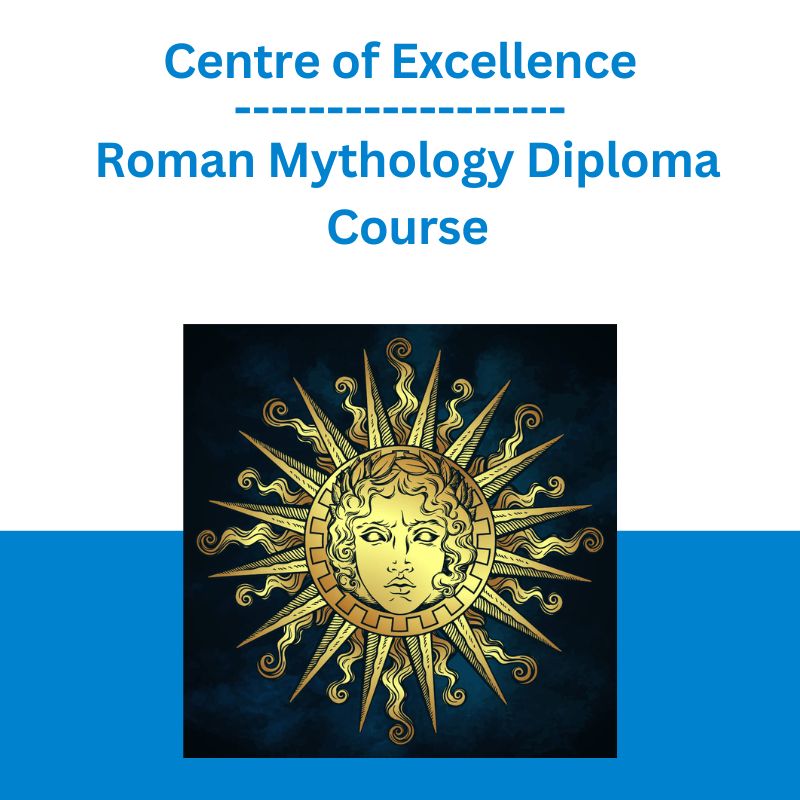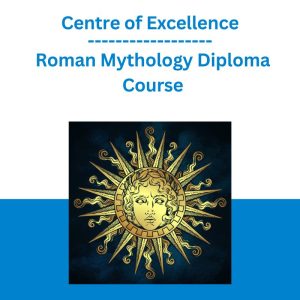*** Proof of Product ***
Exploring the Essential Features of “Centre of Excellence – Roman Mythology Diploma Course”
Roman Mythology Diploma Course
COURSE INFORMATION
- 10 Modules
- Lifetime Access
- 3 Videos
What Will You Learn?
The major myths of ancient Rome – stories of gods and goddesses, heroes and heroines. From the Roman Mythology Diploma Course, you’ll not only learn about these myths but also their context within Rome’s rise to glory and the crucial political and social function that mythology had in shaping Rome into one of the world’s greatest civilisations.
The course opens with an exploration of the origin myth, private and public practices of ancient religious rituals, and the Etruscan and Greek influences on Rome.
We’ll look at the myth of Romulus and Remus and the founding of Rome – from both mythological and archaeological viewpoints – and examine each of the seven kings who are said to have ruled. The course also examines another ‘founding myth’ of Rome through the city’s connection with Troy, where you’ll learn of Aeneas and his importance to Rome. You’ll also learn about the imperial cults that formed as Rome moved from republic to empire and what happened to push the Roman people into accepting their leaders as gods.
We’ll look at early Roman deities, the 12 principal deities, and take an in-depth exploration of Mars and Venus and the Roman god of gods, Jupiter.
The course concludes with an examination of important myths. We’ll look at the Abduction of the Sabine Women and the Rape of Lucretia, exploring how they relate to changes in Roman history. This is followed by a study of the legends Horatius at the Bridge, Coriolanus and Gaius Mucius, and how they relate to Rome’s history and focus on war and valour.
By studying this course, you will:
- Learn about the Etruscan and Greek influences on Rome
- Uncover myths about the founding of Rome and its seven kings
- Become familiar with the imperial cults that formed with the empire
- Learn about Roman deities, in particular Jupiter, Mars, and Venus
- Examine important myths
Course Syllabus
What will I learn on the course?
Module 1: Ancient Roman Religion
- Introduction
- Part 1: The Influence of Etruria on Rome and its Religion
- Part 2: The Influence of Greece on Rome and its Religion
- Part 3: Greek Deities Become Roman Deities
- Part 4: Private and Public Worship
- Part 5: Public Religion
Module 2: The Founding of Rome
- Part 1: Archaeological Evidence for the Founding of Rome
- Part 2: The Wolf Cults of Italy
- Part 3: The Myth of the Founding of Rome
- Part 4: The Beginning of Rome
Module 3: The Seven Ancient Kings of Rome
- Part 1: The Second King of Rome, Numa Pompilius
- Part 2: The Third King of Rome, Tullus Hostilius
- Part 3: The Fourth King of Rome, Ancus Marcius
- Part 4: The Fifth King of Rome, Tarquinius Priscus
- Part 5: The Sixth King of Rome, Servius Tullius
- Part 6: The Seventh King of Rome, Lucius Tarquinius Superbus
Module 4: The Politics of Roman Mythology
- Part 1: The Relationship Between Troy and Rome
- Part 2: Rooting the Warrior in the Religious
- Part 3: Religion Imbued in Government
- Video: Myth and Myth Making
Module 5: Imperial Cults
- Part 1: New Enemies, A New Rome
- Part 2: The Decline of the Republic and the Rise of the Empire
- Part 3: Rome Under Augustus
- Part 4: The Relationship Between Genius and Emperors
- Part 5: Imperial Cult Practices
Module 6: Rome’s Main Gods and Goddesses
- Part 1: The Di Selecti
- Part 2: The Di Consentes
- Part 3: Minor Roman Gods and Triads of Deities
- Video: Uniquely Roman Deities
Module 7: Myths of Jupiter, the Chief Deity of Rome
- Part 1: Jupiter’s Arrival in Rome
- Part 2: Jupiter and the Conflict of the Orders
- Part 3: Myths of Jupiter
- Video: The Capitoline Triad
Module 8: Myths of Mars and Venus
- Part 1: The God of War: Mars
- Part 2: The Development of the Goddess Venus
- Part 3: Myth: Mars and Venus Caught in a Net
Module 9: Women and the Mytho-History of Rome
- Part 1: The Abduction of the Sabine Women
- Part 2: The Rape of Lucretia
Module 10: Men and the Mytho-History of Rome
- Part 1: The Myth of Horatius at the Bridge
- Part 2: The Myth of Gaius Mucius Cordus
- Part 3: The Myth of Coriolanus
- Conclusion
Who Would Benefit from This Course?
If you’re interested in history, culture, mythologies or religion, this course is the perfect combination of these four subjects. The mythology of a people is so entwined with their hopes and beliefs that myth and reality affect one another in incredibly powerful ways. The Roman Mythology Diploma Course doesn’t merely retell the myths but explains how Roman mythology developed, and its significance in Rome’s rise to power and cultural identity.
Please see the full list of alternative group-buy courses available here: https://lunacourse.com/shop/










 Centre of Excellence - Roman Mythology Diploma Course
Centre of Excellence - Roman Mythology Diploma Course